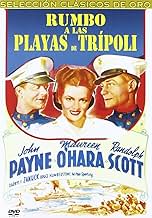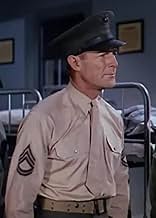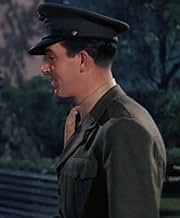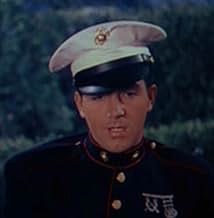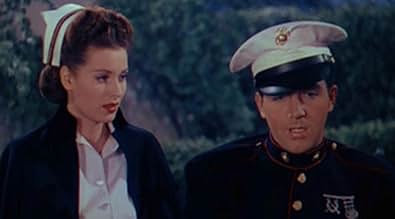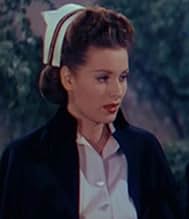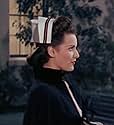NOTE IMDb
6,0/10
1,1 k
MA NOTE
Ajouter une intrigue dans votre langueLife at the Marine Training Base in San Diego on the eve of the Japanese attack on Pearl Harbor.Life at the Marine Training Base in San Diego on the eve of the Japanese attack on Pearl Harbor.Life at the Marine Training Base in San Diego on the eve of the Japanese attack on Pearl Harbor.
- Réalisation
- Scénario
- Casting principal
- Nommé pour 1 Oscar
- 1 victoire et 1 nomination au total
Harry Morgan
- Mouthy
- (as Henry Morgan)
Joseph Crehan
- Uncle Bob
- (scènes coupées)
John Hamilton
- Gen. Gordon
- (scènes coupées)
Iris Adrian
- Okay's Girlfriend
- (non crédité)
Stanley Andrews
- Doctor
- (non crédité)
Hugh Beaumont
- Orderly
- (non crédité)
Avis à la une
While the story line is only so-so, the list of stars is quite impressive. The really special part of this movie is the exposure that the Marines in San Diego had to so many of the stars of the day. My father's unit (he was a DI) was used to film the movie. When you see Randolph Scott drilling his men, the close-ups are of Mr. Scott - the far off shots are of my father. My father also appears as an extra in other shots - the most noticeable being the scene where the men are all sitting in the bleachers. The really memorable aspect (and hopefully not TOO sentimental) of all this centers around the fact that this is the only record I have of my father in a "moving picture" (He died in 1952 when I was 3 years old, and the only pictures I have of him are still shots).
Additionally, I fondly remember a large autographed picture by Randolph Scott inscribed to my father and the men in the unit - sitting in front of the men are Mr. Scott and my father, both wearing their round DI hats. This picture was also very special to all of us children. Therefore, this movie, while never going down as one of the great ones, will always have a very special place in my heart. It also gives me a better appreciation of movie "extras" and makes me wonder, "who are they and whatever happened to them"!
Additionally, I fondly remember a large autographed picture by Randolph Scott inscribed to my father and the men in the unit - sitting in front of the men are Mr. Scott and my father, both wearing their round DI hats. This picture was also very special to all of us children. Therefore, this movie, while never going down as one of the great ones, will always have a very special place in my heart. It also gives me a better appreciation of movie "extras" and makes me wonder, "who are they and whatever happened to them"!
After watching this movie, I now know where the "Officer and a Gentleman" screen writers probably got their idea for the character Sgt. Foley. Randolph Scott was the Sgt. Foley of the 1940s. This movie was made during World War Two, but it spares us the jingoistic propaganda associated with most war movies of that era and offers interesting and likable characters, especially Maureen O'Hara as a Navy nurse and John Payne as the recruit. While watching this movie I thought of Richard Gere and how he would have fit in well in this movie. The similarities between this movie and "Officer" must be more than just coincidental. "Officer" was more intense but this movie did not need to rely on such theatrics to maintain audience interest because the star of this movie was the USMC itself.
I agree with the evaluation of bsmith5552 that it is a disappointing flagwaver, and essentially a U.S.Marine recruitment film. But it has its own place in history. I have just been refreshed as to that place in history by watching again the film version of Leon Uris's first (and maybe best) novel, Battle Cry. Uris dramatized his own experience as a young marine, first training in the States, then in Wellington and elsewhere in New Zealand and finally fighting in the islands of the Pacific He has a fascinating picture of what it was like for young Americans to find themselves in a strange and previously unheard of land like New Zealand. I was a Kiwi teenager in Wellington at that time and can vouch for the accuracy of Uris' depiction of the impact of the descent of thousands of young marines on our city and of their interaction with the locals. To the Shores of Tripoli screened in Wellington in 1942, not long after Pearl Harbor, in the time the newly formed Marine Divisions were there preparing for their involvement in the war in the South Pacific. Through that film we saw on our screens the training only months earlier of the men who were now in our midst. Bsmith5552 speaks of the repetitive sequences of close order drill. I watched the marine band perform those intricate marching exercises in colour film in a local cinema ("picture theatre" in our brand of English). This was the same week I saw them do it live in Wellington. I was transfixed as I saw utterly committed young marines rise and stand to attention in their places in the cinema as the Marines Hymn came through on the film's sound track. I was not simply present at a piece of entertainment. I was watching live drama. To the Shores of Tripoli may not have been a great movie. But in the South Pacific in 1942, when we (maybe unlike today's Iraquis) welcomed the Marines as life savers, preserving us from a Japanese invasion, it had its place in the drama of that time. I viewed it sixty years ago with great interest. I would like the little niche it has in cinema history to be remembered.
Stepping into the hero/heel part that Tyrone Power specialized in while at 20th Century Fox is John Payne as the spoiled kid of a former Marine officer, Minor Watson. Payne's hoping to get out of the Marines for a nice desk job in Washington, DC, but Watson's hoping that his former sergeant Randolph Scott, now a drill instructor will give Payne the necessary attitude adjustment.
Payne's getting an attitude adjustment in another direction too. He's fallen for pretty nurse Maureen O'Hara even though he's got Washington society girl Nancy Kelly pulling strings for him.
The part is such a perfect one for Tyrone Power that I'm sure it was offered to him and rejected and given to Payne who was hired by Darryl Zanuck because of his resemblance to Power and the fact he could sing opposite Alice Faye and Betty Grable. Power did similar roles in A Yank in the Raf and Crash Dive and in fact did serve in the Marines in the South Pacific after 1943.
The film was shot on location at the San Diego Marine training station and I visited San Diego a few years back and some of it looks pretty much the same. Harry Morgan made his feature film debut and if you look close you'll see that another one of the Marine recruits is the Skipper himself, Alan Hale, Jr.
To the Shores of Tripoli is badly dated and doesn't play real well against today's attitudes. Still it's a great example of a World War II propaganda piece.
Payne's getting an attitude adjustment in another direction too. He's fallen for pretty nurse Maureen O'Hara even though he's got Washington society girl Nancy Kelly pulling strings for him.
The part is such a perfect one for Tyrone Power that I'm sure it was offered to him and rejected and given to Payne who was hired by Darryl Zanuck because of his resemblance to Power and the fact he could sing opposite Alice Faye and Betty Grable. Power did similar roles in A Yank in the Raf and Crash Dive and in fact did serve in the Marines in the South Pacific after 1943.
The film was shot on location at the San Diego Marine training station and I visited San Diego a few years back and some of it looks pretty much the same. Harry Morgan made his feature film debut and if you look close you'll see that another one of the Marine recruits is the Skipper himself, Alan Hale, Jr.
To the Shores of Tripoli is badly dated and doesn't play real well against today's attitudes. Still it's a great example of a World War II propaganda piece.
The plot of "To the Shores of Tripoli" is very, very similar to the very popular "Buck Privates" starring Bud Abbott and Lou Costello. But, unlike this film from the year before, "To the Shores of Tripoli" is not meant to be a comedy. Like the earlier film, this one starts with an obnoxious and self-assured brat of a man (John Payne) walking into the Marine base--assuming because of his connections that he will be accorded special privileges. But, like the other film, his father goes behind his back and insists that his son needs character building and NO exceptions or special favors should be granted to him. And, like "Buck Privates", the brat manages to make a nuisance of himself until, ultimately, he finds redemption. In the interim, he relentlessly chases a pretty nurse (Maureen O'Hara), tangles repeatedly with his Sergeant and makes a few friends--then alienates them with his boorish attitude.
Overall, the film looks great. It's filmed in full color--the sort of intense 1940s color that doesn't quite look real, but is better in some ways than real life! The acting is excellent (with Payne, O'Hara and Randolph Scott) and there is a nice group of actors who play the recruits such as Harry Morgan (in his first film), "Slapsie" Maxie Rosenbloom and William Tracy (famous for his Sergeant Doubleday films with Hal Roach). As for the story, it's very predictable and formulaic throughout, but it's well-made formula! Mindless but very enjoyable wartime propaganda that must have done a lot to bolster the public behind the war effort.
Overall, the film looks great. It's filmed in full color--the sort of intense 1940s color that doesn't quite look real, but is better in some ways than real life! The acting is excellent (with Payne, O'Hara and Randolph Scott) and there is a nice group of actors who play the recruits such as Harry Morgan (in his first film), "Slapsie" Maxie Rosenbloom and William Tracy (famous for his Sergeant Doubleday films with Hal Roach). As for the story, it's very predictable and formulaic throughout, but it's well-made formula! Mindless but very enjoyable wartime propaganda that must have done a lot to bolster the public behind the war effort.
Le saviez-vous
- AnecdotesMaureen O'Haras' first film in Technicolor. She looked so good in it that she later earned the nickname "Queen of Technicolor".
- GaffesIn several instances Chris Winters (John Payne) and Sgt. Smith (Randolph Scott) are shown flicking lit cigarettes away, or grinding them into the ground. This would never be allowed as Marines were taught to field strip cigarettes, spreading the ashes and tobacco and rolling the paper into a tiny ball.
- Citations
Sgt. Dixie Smith: Good morning, Roberts.
Corporal: Good morning, Sergeant. You're up kind of early.
Sgt. Dixie Smith: Yeah, I'm expecting a guest.
Corporal: Don't tell me Cagney's coming down here to glorify the Marines again.
- ConnexionsEdited into La guerre, la musique, Hollywood et nous... (1976)
- Bandes originalesI Know Why (and So Do You)
(uncredited)
Music by Harry Warren
Played at the first dance and at various times throughout the picture
Meilleurs choix
Connectez-vous pour évaluer et suivre la liste de favoris afin de recevoir des recommandations personnalisées
- How long is To the Shores of Tripoli?Alimenté par Alexa
Détails
Box-office
- Montant brut aux États-Unis et au Canada
- 2 300 000 $US
- Durée
- 1h 26min(86 min)
- Rapport de forme
- 1.37 : 1
Contribuer à cette page
Suggérer une modification ou ajouter du contenu manquant


